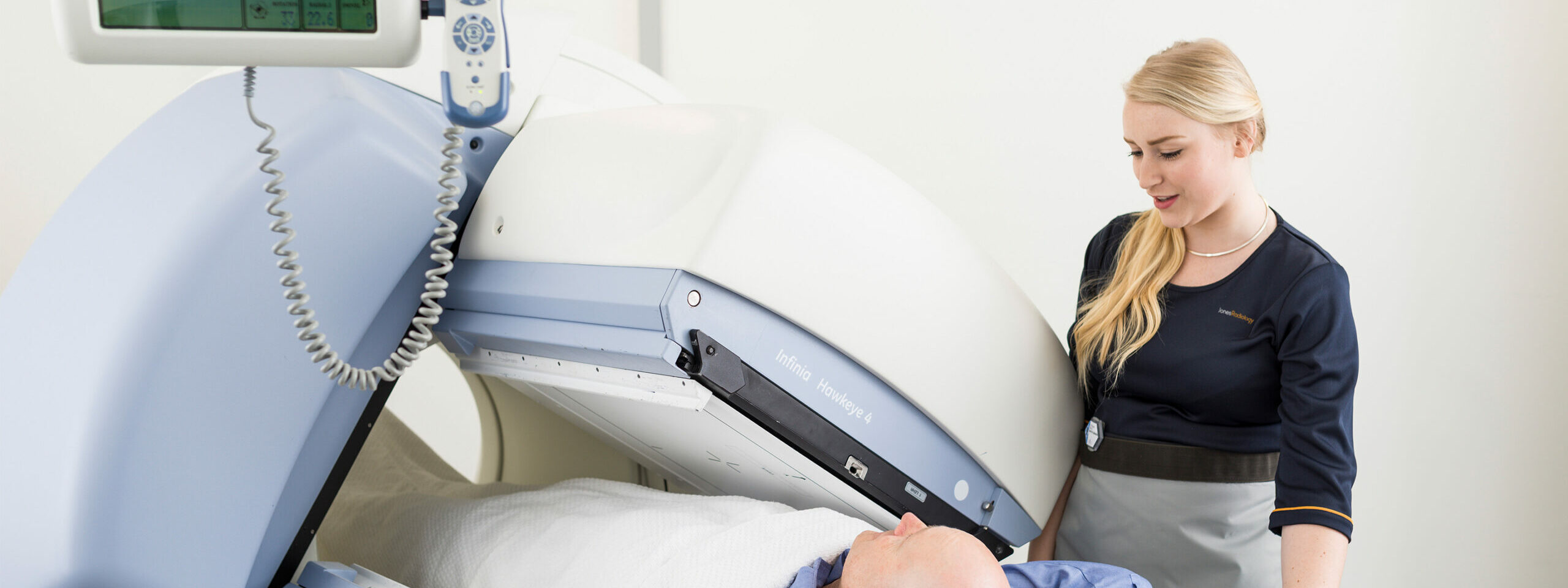Nuclear Medicine is medical imaging that uses special radiopharmaceuticals to diagnose various conditions and is sometimes used to treat disease.
Radiopharmaceuticals are substances that are attracted to specific parts of the body and highlight the way that certain organs function.
All Jones Radiology Nuclear Medicine scanners have a technology called SPECT/CT that combines a state-of-the-art NM camera with the ability to perform low-dose CT. This technology allows the fusion of structural and functional information in the one study and has increased the diagnostic usefulness of this discipline.
Preparation – Nuclear Medicine Scan
Before the scan, you may be asked to change into an examination gown for your comfort, and to ensure clothing does not affect the images and diagnostic quality of the scan. You may also be asked to remove jewellery, eye-glasses and any metal objects that might interfere with the images.
If you are breastfeeding, pregnant or possibly pregnant, staff will ask for more information to determine the timing and type of test you will need. Staff will ask about medications you may be taking. Some drugs may alter the results of a test (particularly kidney, stomach and bowel scans) and may need to be stopped for a few days beforehand.
Does it matter if I am pregnant or breastfeeding?
Yes. If there is a possibility of pregnancy, we prefer to delay the test unless it is necessary. Some tests may need to be changed if you are breastfeeding or you may need to avoid breastfeeding for up to 1 hour after the test. Please tell us when you make your booking, and we will discuss this with you.
Procedure
During the procedure, you are given a small dose of a radiopharmaceutical. What is given and how you are given it (whether it be by injection into a vein, through a breathing apparatus or by mouth) depends on which test you are having, although most commonly it involves a small injection into a vein. The substance goes to a specific organ or part of your body (e.g., kidneys or bone).
A device called a gamma camera is placed next to the organ being examined to produce the images. The timing of this depends on the particular test. For example, the thyroid gland is scanned approximately 20 minutes after you are given the substance. For a bone scan, you will be asked to return between 2 to 4 hours after the injection, during which time the radiopharmaceutical will have been taken up by the bones. Occasionally, some tests may require returning on an additional day for images.
Duration
How long a procedure takes will vary; the delay between being given the radiopharmaceutical and the scan can be several minutes, several hours, and rarely, several days.
Risks / Side effects
Side effects from radiopharmaceuticals such as nausea, vomiting or a rash are very uncommon, occurring in approximately 1 in 10,000 people.
After the Test
After the test, the specialist will examine the films and send a report to your doctor.
Staff will advise you if there are any precautions you need to follow after your tests. For example, if you are breastfeeding, you may need to avoid breastfeeding for up to 1 hour after the test. It may be necessary to avoid close contact with pregnant women or young children for several hours after the test.
After the procedure, you can drive a car, and eat and drink normally.
How long will I have the radiopharmaceutical in me?
The radiopharmaceuticals break down by themselves in a short time. Most are undetectable within 24 – 36 hours. The total radiation dose is similar to or less than other imaging procedures such as CT scans.
Will I glow in the dark?
No, you won’t. There is only a small amount of radioactivity in the injection which disappears quickly.
View the Patient Care page for additional information regarding patient safety.
Are you ready to make your Nuclear Medicine appointment?
Our online booking platform allows you to quickly and easily make an appointment online.



